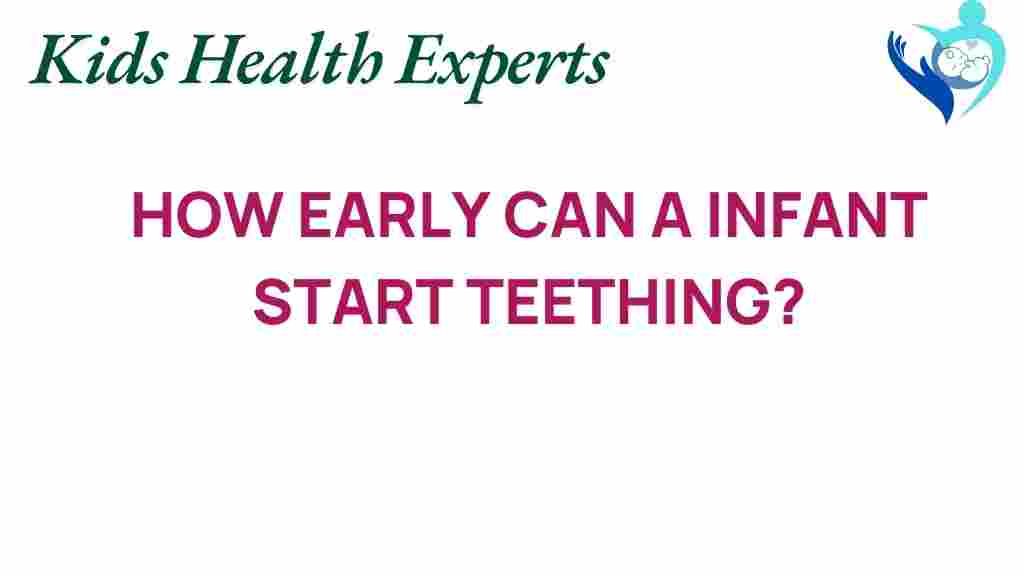The Surprising Age When Infants Begin Teething: What Parents Should Know
As new parents, understanding the stages of infant development is crucial, especially when it comes to significant milestones like teething. Teething can often come as a surprise to many parents, especially regarding when it starts and how it affects their baby’s comfort and overall dental health. This article will delve into the typical ages for teething, the signs to look for, and essential parenting tips to ease this developmental phase.
What is Teething?
Teething refers to the process of baby teeth emerging through the gums. The first set of teeth, commonly known as primary or baby teeth, is crucial for a child’s development. They help with eating, speaking, and even maintaining space for adult teeth in the future.
When Does Teething Typically Occur?
Most parents expect teething to begin around six months of age. However, it’s important to note that this is just an average timeframe. Some infants might start as early as three months, while others may not begin until after their first birthday. Here’s a breakdown of the typical timeline:
- 3-6 months: Early signs of teething such as drooling or gnawing may start appearing.
- 6-10 months: The first teeth usually erupt during this period, commonly the lower central incisors.
- 10-14 months: Upper central incisors typically emerge next.
- 15-24 months: Additional teeth, including lateral incisors, first molars, and canines, will follow.
Early Signs of Teething
Recognizing the early signs of teething can help parents provide comfort to their infants. Here are some key indicators:
- Increased drooling: Excess saliva production is common as gums become irritated.
- Chewing on objects: Babies often seek relief by gnawing on their toys or fingers.
- Irritability: Discomfort from emerging teeth can lead to fussiness and crying.
- Sleep disturbances: Teething pain can disrupt an infant’s sleep patterns.
- Swollen gums: Parents may notice redness and swelling in the gums where the tooth is about to break through.
How to Ease Teething Pain
As a parent, it’s important to know how to soothe your infant during this challenging time. Here are some effective parenting tips to alleviate discomfort:
Teething Remedies
- Teething rings: Chilling a teething ring can provide relief, as the cold numbs the gums.
- Cold washcloth: Let your baby chew on a clean, cold washcloth for soothing relief.
- Massage the gums: Gently rubbing your baby’s gums with a clean finger can help ease pain.
- Over-the-counter medications: Consult your pediatrician about using pain relief medications like acetaminophen or ibuprofen.
- Distraction: Engage your baby in play or activities to take their mind off the discomfort.
The Role of Dental Health in Teething
Maintaining good dental health during the teething phase sets a positive foundation for your child’s future oral care. Here are some important practices:
- Regular dental check-ups: Schedule the first dental visit by age one to ensure healthy development.
- Cleaning the gums: Even before teeth emerge, wipe your baby’s gums with a soft, damp cloth after feedings.
- Healthy diet: Provide nutritious foods that support dental health and avoid sugary snacks.
Milestones of Teething and Infant Development
Understanding teething in the context of milestones can help parents track their child’s infant development. The emergence of teeth usually coincides with other developmental milestones, such as:
- Beginning to crawl: Many babies start crawling around the same time as teething.
- First words: Some infants may begin to babble or say their first words as teeth emerge.
- Eating solids: The introduction of solid foods often coincides with the arrival of teeth.
Common Challenges During Teething
While teething is a natural process, it can present several challenges for both infants and parents. Here’s how to troubleshoot common issues:
Fussiness and Irritability
It’s common for babies to become more irritable during the teething phase. If your baby seems particularly fussy:
- Ensure they are comfortable and check for any other sources of discomfort, such as a wet diaper.
- Try varying their environment to see if a change of scenery helps.
- Engage them with toys or activities that stimulate their senses.
Sleep Disruptions
If teething causes sleep disturbances, consider the following:
- Establish a calming bedtime routine to help your infant relax.
- Keep the sleeping area comfortable and conducive to rest.
- Use a teething gel or consult your pediatrician for safe pain relief options.
Loss of Appetite
Some infants may experience a temporary loss of appetite due to teething discomfort. To manage this, you can:
- Offer soft, cool foods that are easier to chew.
- Encourage frequent, small meals instead of larger portions.
- Stay patient and persistent; most infants will return to their normal eating habits once the teething phase passes.
Conclusion
In summary, the teething process is a significant milestone in an infant’s development. Understanding when it typically occurs, recognizing the early signs, and knowing how to soothe your baby can make this stage easier for both you and your child. By maintaining good dental health practices and being aware of common challenges, parents can navigate this developmental phase with confidence.
For more information on child care and infant care, consider visiting this resource. Additionally, you can find expert tips on parenting at this website.
This article is in the category Care and created by KidsHealthExperts Team
